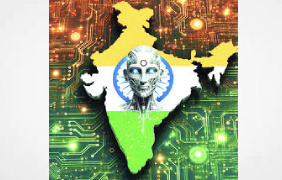n the run-up to Monday and Tuesday’s (February 10 and 11) Paris AI Action Summit—the third such multinational event in the series—another part of the world is being watched.
 Even as Indian prime minister Narenda Modi prepares to co-chair the Paris summit with Emmanuel Macron, one of the American delegation’s members, OpenAI CEO Sam Altman is visiting India this week “as his company fights off a major copyright lawsuit in its second-largest market — yet another legal headache for the creator of ChatGPT as it seeks to cement itself as the global leader in artificial intelligence,” Karishma Mehotra reports for The Washington Post.
Even as Indian prime minister Narenda Modi prepares to co-chair the Paris summit with Emmanuel Macron, one of the American delegation’s members, OpenAI CEO Sam Altman is visiting India this week “as his company fights off a major copyright lawsuit in its second-largest market — yet another legal headache for the creator of ChatGPT as it seeks to cement itself as the global leader in artificial intelligence,” Karishma Mehotra reports for The Washington Post.
The suit, Mehotra writes, “is led by one of the country’s largest news wires and has united players across a diverse, often fragmented Indian media landscape.”
At BBC Hindi, Umang Poddar writes, “OpenAI is facing at least a dozen lawsuits across the world filed by [book] publishers, artists and news organizations, who have all accused ChatGPT of using their content without permission. … The case holds significance for ChatGPT given its plans to expand in the country. According to a survey, India already has the largest user base of ChatGPT.”
With Altman having met Wednesday (February 5) with India’s IT minister Ashwini Vaishnaw, Abhinav Sharma writes for Diya TV, “During their meeting, Vaishnaw outlined India’s plan to establish an entire AI stack encompassing GPUs, models, and applications. He shared on X [formerly Twitter] that OpenAI expressed willingness to collaborate across all three areas.
“Altman highlighted India’s significance to OpenAI, noting that the country has become its second-largest market, with user numbers tripling over the past year.”
And at Reuters, Arpan Chaturvedi, Aditya Kalra and Munsif Vengattil write that “OpenAI faces an uphill climb as it argues that Indian courts cannot hear lawsuits about its US-based business in the country, where Telegram has failed with similar defenses and US technology firms have faced government heat on compliance. … OpenAI, which is facing new challenges from Chinese startup DeepSeek’s breakthrough cheap AI computing, has maintained it builds its AI models using public information in line with fair use principles.
“The company faces similar copyright infringement lawsuits in the United States, Germany and Canada.”
Chaturvedi, Kalra, and Vengattil go on to write about an Indian author who sued Telegram for copyrighted work she alleged was leaked by the platform into Telegram groups. When Telegram argued that it was bound by Dubai’s laws, not India’s, a judge ruled that “the conventional concepts of territoriality no longer exist … [Telegram choosing] not to locate its servers in India cannot divest the Indian courts from dealing with copyright disputes.”
The density and heat that has developed between the book publishing business, many “nearby” creative industries, and the AI community, may well be among the most readily volatile during Monday and Tuesday’s Paris exercise.
Returning to Mehotra’s piece at The Washington Post: “Since the release of ChatGPT, OpenAI has become entangled in legal battles with artists, actors and authors, as well as media companies. … Courts and governments around the world are scrambling to set boundaries around the development of generative AI, which is developed by running complex algorithms on huge datasets often taken from the public Internet.”




